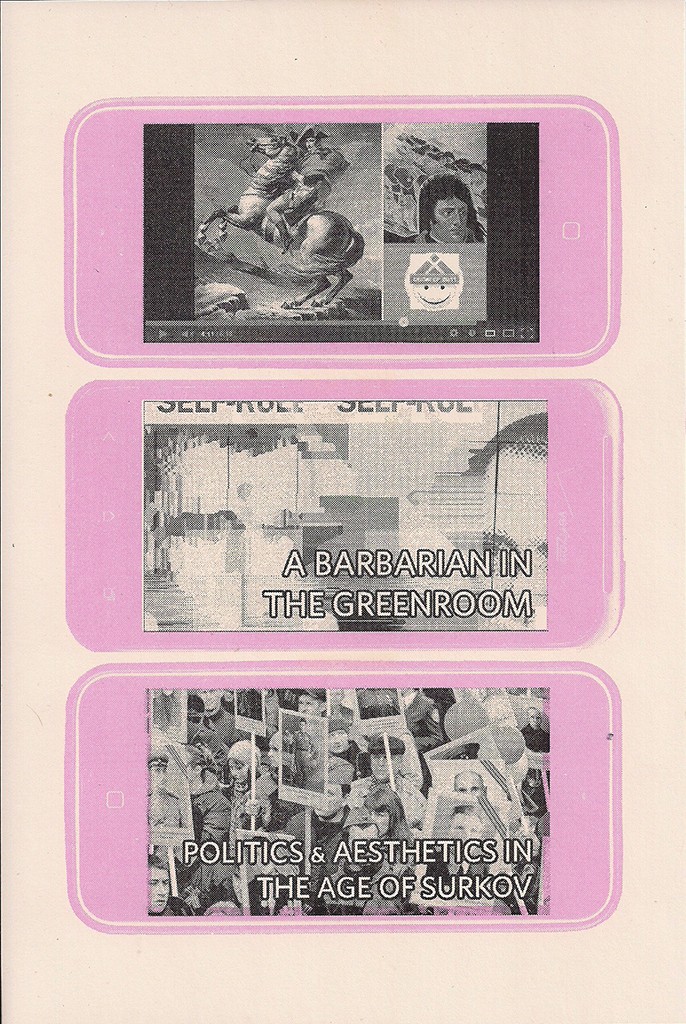
Cicada Press editors Matthew Whitley and Anastasiya Osipova recently created a micropublication and risograph series of prints for the show “Vertical Reach: Political Protest and the Militant Aesthetic Now,” hosted by Artspace in New Haven. The edition, entitled “A Barbarian in the Greenroom: Politics and Aesthetics in the Age of Surkov,” consists of 2 large installation prints, along with 12 packaged prints and accompanying texts, as a sort of bestiary of contemporary political concepts, tactics and strategies. All can be loosely tied to Kremlin ideologue and strategist Vladislav Surkov, who is taken as the publication’s skeletal core and anti-hero.
From the introductory text:
I fear that we’ve chosen too soft of a target by focusing on this man. The baby fat clings to his cheeks. His face is overripe. He is a low-hanging fruit, a perfect cliché of a postmodern puppet master, a caricature that arrived to Russia with a ten-year delay and was embraced with full provincial abandon. In truth, we find nothing spectacular about his character and could not care less about his moral qualms, his guilt and the ironic self-consciousness that he parades in his poems and novels (the man is a sentimental bastard). But we hope to make use of his skeleton. If Surkov were to be transposed to a fashion runway you would say that he has a perfect model’s body, anything you dress him with hangs beautifully and he doesn’t distract from the clothes. And when speaking of the convergence of politics and aesthetics Surkov is an ideal dress form.
He has been, at different times: a Chechen child named Aslambek Dudaev, a student of theater direction, a body guard, an advertising expert, a public relations chief, a TV director, a novelist, a lyricist, an apparatchik, and a chief Kremlin advisor. An aspiring hipster that gained a position of power from which to translate his adolescent fascination with Borges into reality show politics, he has come to be known as Putin’s “Grey Cardinal.”
We readily recognize him in Vavilen Tatarskiy, the protagonist of Vladimir Pelevin’s Generation P, who makes a breathtaking ascent from the dredges of the literary and esoterically-minded (and, of course, very hungry) intelligentsia, to the rarified elevations of media power, run by a secret cabal all too aware of their own doom. Between Pelevin’s and his own writings (published under the pseudonym of Natan Dubovitsky), Surkov the man disappears, leaving in his place only a living hero by “a dead author,” a figure of literature/art turned politics, without any claims for truth or essentiality. A knock-off boy band effigy.
In the midst of this rhetorical free jazz, all the machinery that manufactures and stylizes politics is laid bare and is paraded without false modesty. A tapestry cut from a swathe of dazzle camouflage fabric – all the deception effective despite being displayed glaringly in the open.
It is this that we find pleasurable, even instructive. The mechanisms of self-aesthecization, the ability to wear many faces to amplify the struggle, the construction and deconstruction of heroes, the capacity to string up new sub cultures by fishing line and a vulgar graphic. In the States, with the collapse of the tribally organized anti-globe movement, we have presently neither the earnestness for ideological struggle nor the romanticism needed for noble suffering. In contemporary Russia, Eduard Limonov, leader of the banned National Bolshevik party, has said, “there is no longer left and right, but the system and those who are against the system.” Limonov speaks with stupidity, but a desperate stupidity stated with a force equal to the ethereal repression that we face. Because we cannot locate the nodes of power, we attack on every front, and represent everything low and reviled. So begins the war of symbols.
A selection from the writing on the concept of “nonlinear warfare:”
A war whose command and control center is the end suite of a freshly cleaned Motel Six. Non-linear war is the conflict of the traveling salesman, the master of liminal space. Here he is at border control, that familiar scene where you stand under the nervous fluorescence and thumb your passport, trying to recall whether you are or are not a criminal, a saboteur. Customs reassures him without sentiment. They tell him that it turns out he is, in fact, a plumber. Relieved, he passes through and politely contacts his sleeper cell from the airport terminal. Subject line: HARDER & STRONGER – KEYSTONE PIPELINE OF VIAGRA ++, BEST ONLINE PHARMS!
We are making sample scans of the publication freely available for download: here, or by clicking on the title image above. Paper copies, prints, and a properly color corrected high resolution digital edition will be made available at the conclusion of the exhibition.